Main A or An Takeaways:
- Deciding whether to use a or an before a word depends on how the word is pronounced.
- Use a before a word that begins with a consonant sound (a cat, a girl, a boat).
- Use an before a word that begins with a vowel sound (an eagle, an Irish girl, an hour).
- A and an are indefinite articles.
- Indefinite articles reference something that is not defined, like an unspecified/unknown item or quantity.
- Definite articles reference something that is defined, like a specific item, location, or action.
When To Use A Or An?
We use a and an depending on how the words sound, not how they are spelled. Use a before words that begin with a consonant sound and use an before words that begin with a vowel sound. If the word begins with an ‘h’ but it’s silent, use an. Here’s a tricky part. Use a for words that begin in ‘h’ but are pronounced. We only use an if using a would sound off or make pronunciation more difficult.
Definite vs. Indefinite Articles
Before we dig deeper into the proper usage of a and an, let us first understand the difference between definite and indefinite articles. To begin with, there is only one definite article in the English language – the. On the other hand, there are two indefinite articles – a and an. The can function as an adjective or an adverb. A and an can only serve as an adjective, not an adverb.
The definite article the indicates that the identity of the noun is known to the reader. However, indefinite articles used before a noun means that the noun’s identity is unknown or general. Here are examples:
Now that you know the difference between definite and indefinite articles, let’s discuss the rules for using a or an.
What Are The Rules For Using A Or An?
The general rule for using a or an is simple. Use a for words that begin with a consonant sound. And use an for words that start with a vowel sound. You can also apply this rule to words that begin with ‘h.’ That’s because this rule applies to the sound of the word’s first letter and not just the letter itself. For instance, if the ‘h’ is silent, use an. If not, use a. Therefore, the indefinite article you use depends entirely on how the article sounds with the word it precedes.
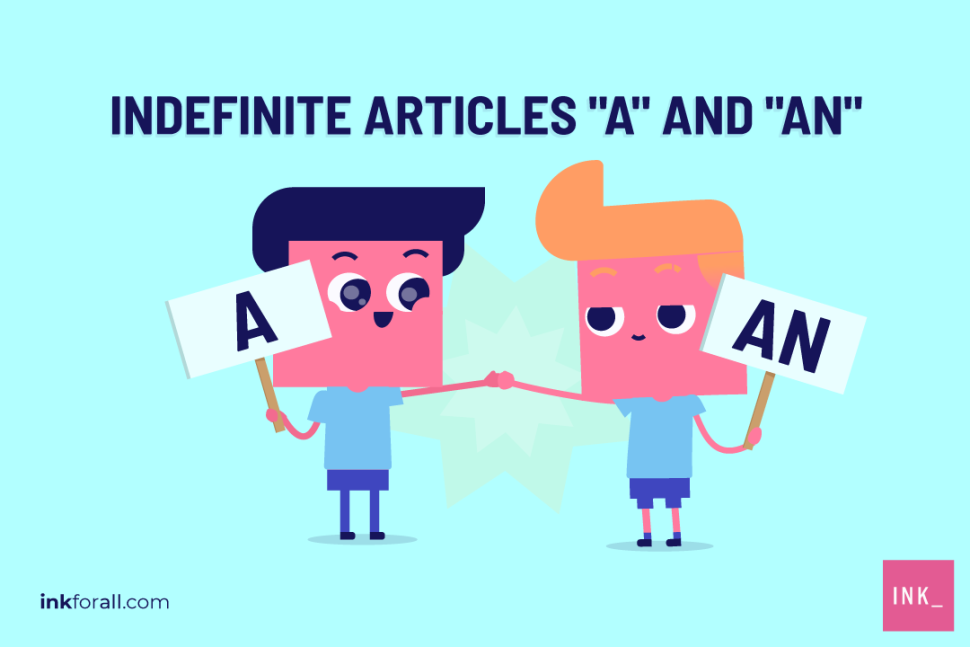

General Rules for A vs. An:
- Useabefore a word that begins with a consonant sound.
- Useanbefore a word that begins with a vowel sound.
Which Is Correct: A Or An?
When deciding whether you should use a or an, say the word out loud. If the word begins with a vowel sound, use an. Words starting with a consonant sound use a. The indefinite article for words that begin with ‘h’ will depend on the word’s pronunciation. For example, use a for words where you pronounce the ‘h’ (a house, a hat). On the other hand, use an for terms where the ‘h’ is silent (an hour, an honor). Therefore, using this rule correctly depends on how the word is pronounced.
What Is The Difference Between A And An?
Beyond the letter ‘n’, the main difference between a and an is their usage. We use a before words that start with a consonant sound. On the other hand, we use an before words that start with a vowel sound. Functionally, there is no difference between a and an because they are both indefinite articles. But, which one to use depends entirely on how we pronounce the word the indefinite article precedes.
Is It A Or An Before H?
Words beginning with ‘h’ don’t follow the rule to use the indefinite article a with words that begin with consonants. Instead, whether to use a or an before ‘h’ depends on how the word is pronounced. For instance, the ‘h’ is silent in the word hour, so the correct indefinite article to use is an (an hour). ‘H’ is not silent in the word hat. So, the right article to us is a.
However, be mindful of regional pronunciation differences. For example, people don’t tend to pronounce the ‘h’ in herbal in the U.S. In the U.K., however, they do. These differences in pronunciation may change which article is correct when.
Is It A Hour Or An Hour?
The correct way to phrase this is an hour, not a hour. The reason is because the actual sound of the word determines which indefinite article we use, not just the first letter. We typically use a for words that begin with a consonant sound but use an for words that begin with a vowel sound. While ‘h’ is a consonant, the letter is silent in the word hour. In other words, we can treat the ‘h’ like it’s invisible. As a result, the word hour actually begins with the vowel sound ‘o’. Since we use an with words that begin with vowel sounds, an is the correct indefinite article for the word hour.
What Is an Indefinite Article Example?
Here are examples of indefinite articles in sentences:
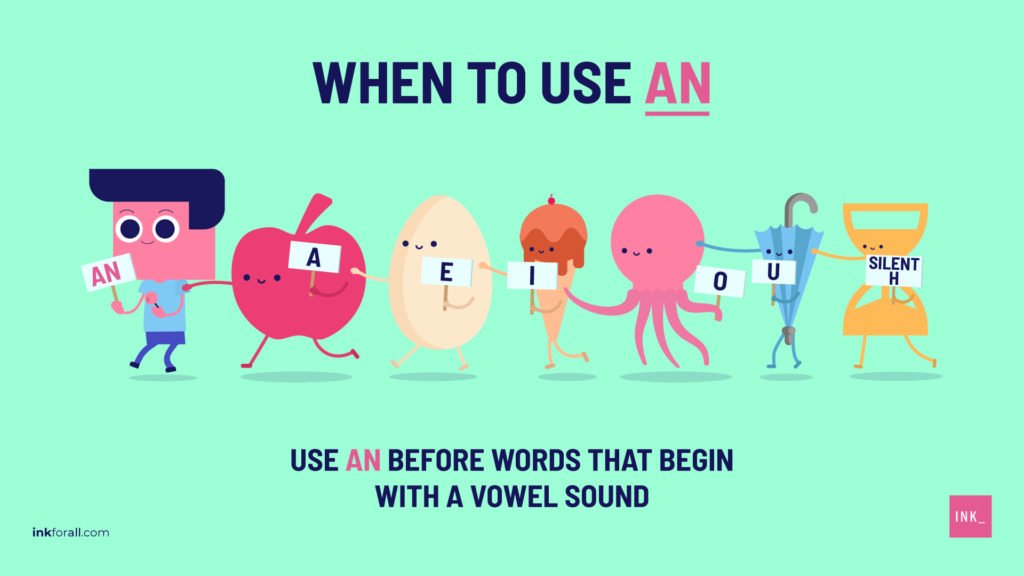

Here are examples of definite articles in sentences:
Do You Always Use An Before a Vowel?
Use the indefinite article an before a spoken vowel sound. We say an when using a would sound less appealing or make the phrase more difficult to pronounce. Regardless of how the word is spelled, only use an before words that begin with a vowel sound. For this reason, you should write an hour, an heir, or an honor. Even though ‘h’ is technically a consonant, it is silent in these examples. As a result, we pronounce the next letter, which is a vowel sound. Since we use an with vowel sounds, an is the correct indefinite article.
Why Are A and An Called Indefinite Articles?
A and an are called indefinite articles. There are three articles in total, and they are a,an, and the. They are a type of adjective because they help describe the noun that they precede. While a and an are indefinite articles, the is a definite article. Use a and an to refer to something that is indefinite, or not defined. This might be something less specific or unqualified (a pen, an overcoat). Similarly, use the to refer to something that is definite, or defined. This might be something you previously mentioned or something specific (the pen, the overcoat).
In the above sentence, you know she attended a meeting. You just don’t know what meeting she attended.
Therefore, since the meeting is not defined, we need to use the indefinite article a.
This sentence is not grammatically correct because meeting starts with a consonant sound, not a vowel sound. You can’t use an before the word meeting.
However, in this sentence you know that she attended a specific meeting. The woman attended themeeting, not ameeting. This sentence implies that the audience knows which meeting is referenced.
Since the meeting is defined, we need to use the definite article the.
Here’s an easy sentence to help you remember definite articles:
I definitely need a definite article when I’m sure about something.
There is no doubt when you use definite articles. You know exactly what you’re referencing, and so does your audience. Stick with indefinite articles when you make vague comments or have an audience that doesn’t care about identity.
How Do We Determine Indefinite Article A or An?
The best way to determine whether to use a or an is to say the word out loud. For example, if the word begins with a consonant sound (not a vowel sound), then use a. However, if the word begins with a vowel sound, use an. Remember: the sound of the first letter of the word determines which indefinite article to use, not the first letter of the word.
What Are Indefinite Articles In English?
In English, there are two types of articles: definite (the) and indefinite (a, an). Use a definite article for things that are clearly and specifically defined. For example, when you’re talking about something specific, use the. Use an indefinite article for things that are not clearly and specifically defined. For instance, when you’re talking about something in general, use aor an depending on which sounds the word begins with.
In this example, we’re talking about a specific person (Sophia) and how she stands out above the rest for the speaker. Since we’re referencing something specific and defined, we need to use the definite article the.
Whether the word begins with a consonant or vowel sound, use the when you need a definite article.
Read More:The Definitive Guide: When To Use Was Vs. Were
Here, we’re talking about one of many identical ballots that the person requested. Since were referencing something general and not defined, we should use the indefinite article a.
If the word began with a vowel sound instead of a consonant sound like ‘b’, we’d use the indefinite article an.
In some rare cases, both an indefinite and definite article may make sense, depending on what you are trying to say.
For example, the first sentence uses the indefinite article an. This is correct because I’m not talking about a specific or defined egg sandwich. Rather, I’m talking about one of the many egg sandwiches the restaurant has to order in general. Since I’m referencing something undefined, I need to use indefinite article.
Moreover, since the word egg begins with a vowel sound, I should use the indefinite article an.
Can We Use Indefinite Article Before Uncountable Nouns?
Nouns can be countable or uncountable. Meaning, you can either count their quantity or not. Countable nouns or count nouns are either singular or plural. In contrast, uncountable nouns or noncount nouns are always singular. As a general rule, we only use indefinite articles before countable nouns indicating one quantity. For uncountable nouns, we can either use the definite article the or not (zero article).
In our first example, the term “drop” indicates one quantity. Thus, we used the indefinite article a. However, in our second example, a precedes the uncountable word “blood“, which is incorrect. The correct sentence(s) should be:
Why Is It Called Indefinite Article?
A and an are called indefinite articles because we use them to refer to things that are not defined, or indefinite. In fact, the word indefinite comes from combining the Latin prefix –in (meaning not) with the word definitis (meaning defined). In other words, indefinite articles refer to something that is not specific. This may be an undefined or unknown quantity or item.
Quick Recap: When and How To Use A Or An?
When to use a or an depends on how you pronounce the word in question. It’s important to note that the sound governs which indefinite article you use, not simply the first letter. This means that actually saying the word aloud will help you determine which article to use, and not just looking at the first letter. On one hand, use a if the word begins with a consonant sound (a chicken, a ballot). On the other hand, use an if the word begins with a vowel sound. Additionally, use a before words that begin with a hard ‘h’ sound. Conversely, use an before words that begin with a silent ‘h’.
Quick Indefinite Articles A or An Grammar Quiz
Indefinite Article A or An Question #1
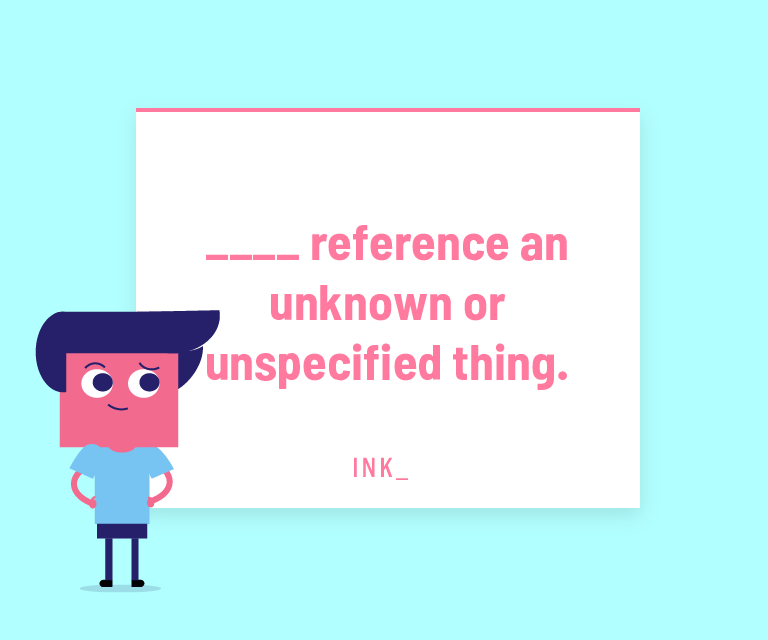

The answer is INDEFINITE ARTICLES. Indefinite articles reference an unspecified or unknown item or quantity.
Indefinite Articles Question #2
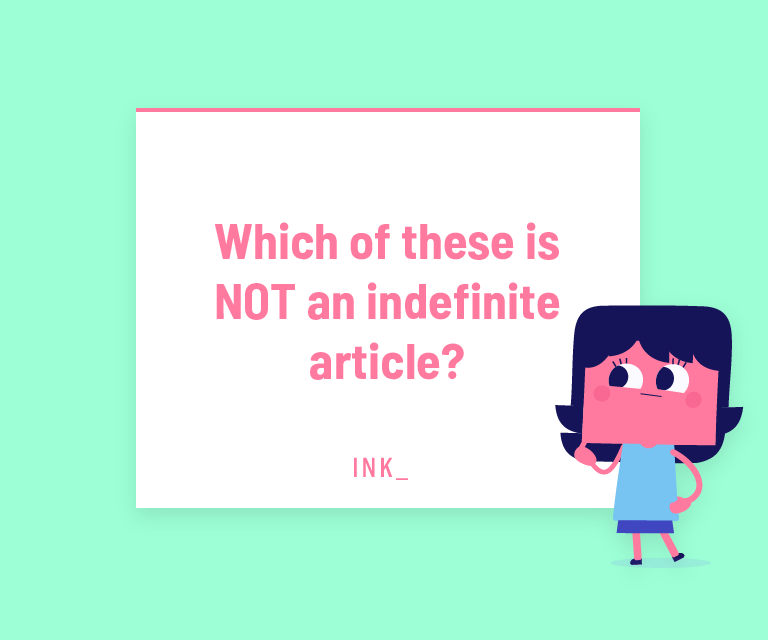

The answer is "A." “The” is a definite article which references a specific person, item, quantity, or event.
A or An Question #3
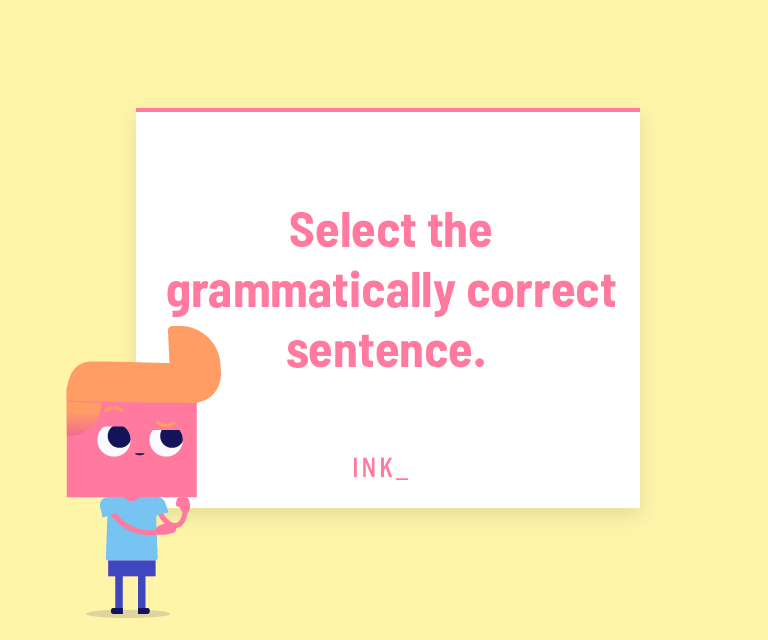

The answer is A. Use “a” before a word that begins with a consonant sound.
An or A Question #4
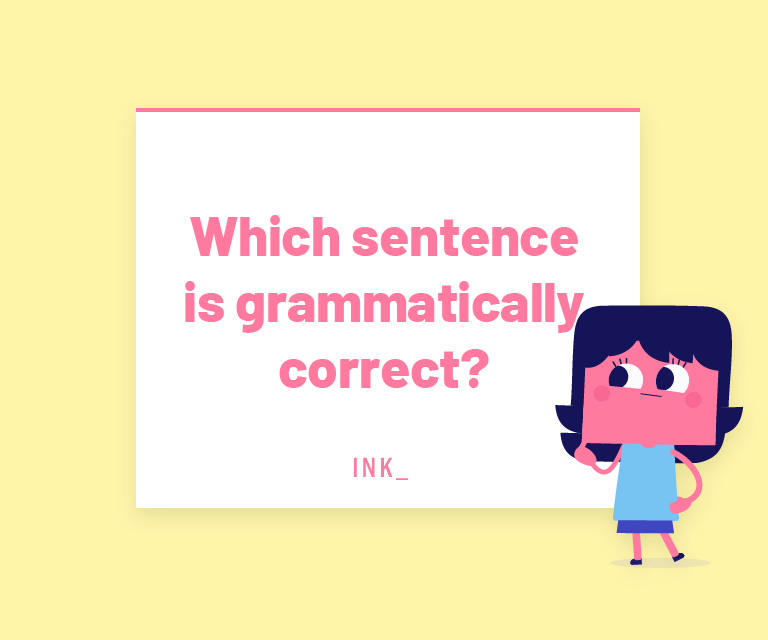

The answer is B. “MBA” is pronounced with a vowel sound even though it starts with a consonant.
Article Grammar Question #5
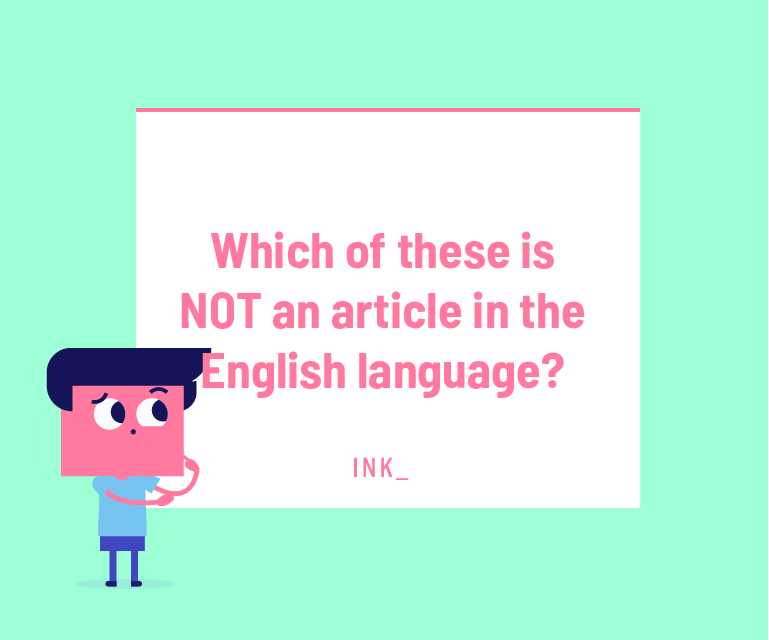

The answer is "AT." The three articles in the English language are “a,” “an,” and “the”.
Indefinite Article Question #6
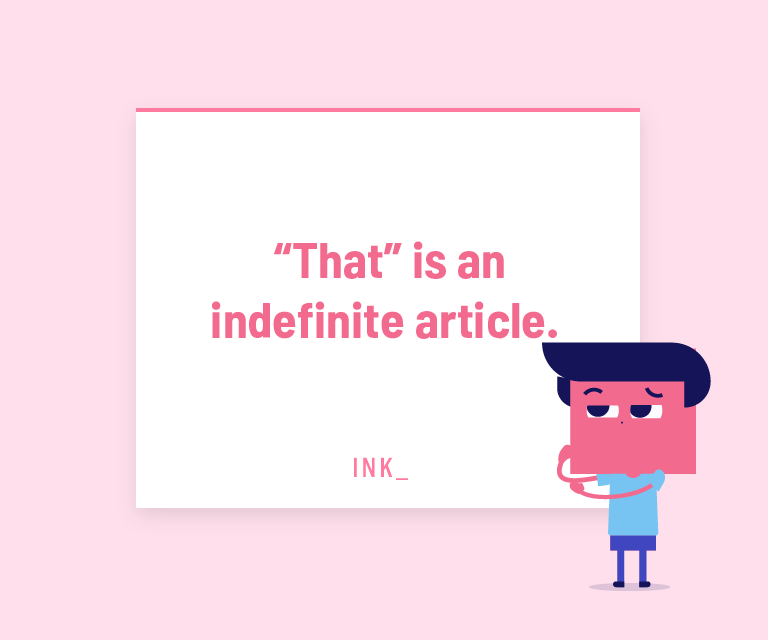

The answer is FALSE. Although “that” is not a definite article, it can function as a definite article, adverb, conjunction, pronoun, or adjective.
